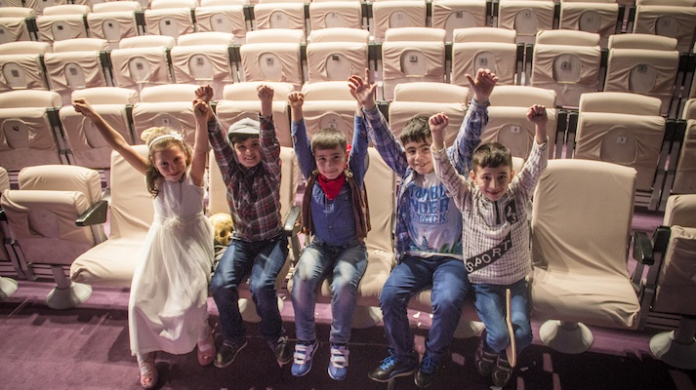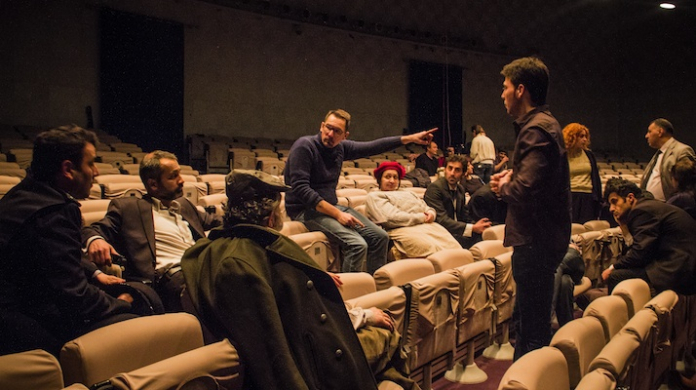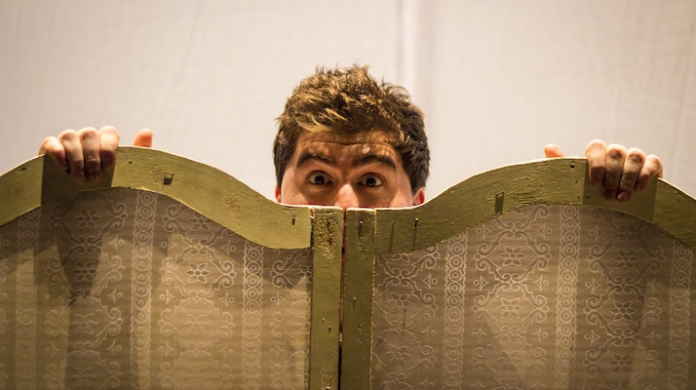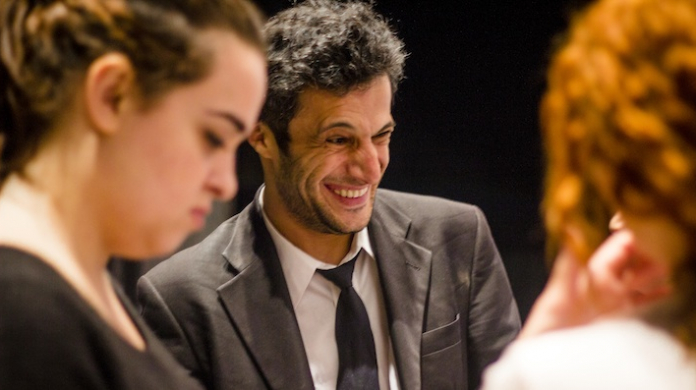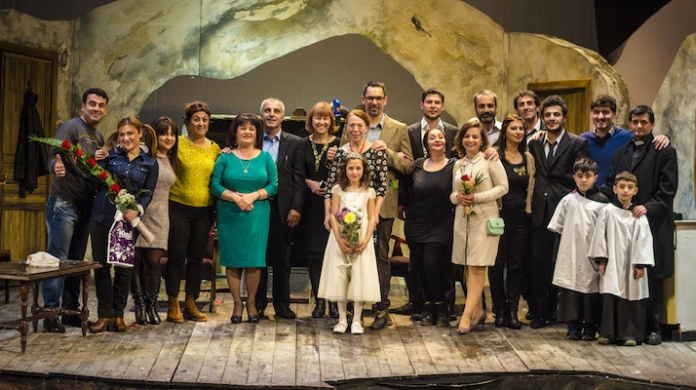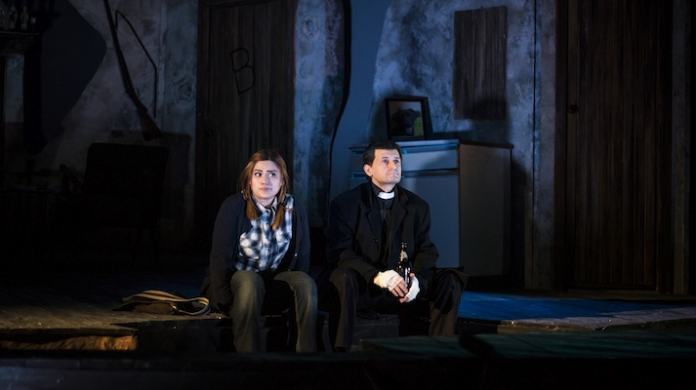Staging Irish plays in Azerbaijan was a challenge, but the results were incredible writes Elizabeth White
Making history on stage
There’s a moment in this production of Martin McDonagh’s The Lonesome West when one of two brothers, mid-quarrel, sweeps a mantelpiece clear of 30 plaster figurines of saints, collected and prized by his brother. The play ends, the stage still white with crushed plaster. The audience is on its feet, applauding, the cast take their calls, the director is almost smiling, and all the verve and glamour and laughter of the performance is still with the crowd as they move out into the streets of Baku. One of the British Council volunteers, up there with the technicians on stage, picks up pieces of painted plaster. When the play’s put on again, they’re going to need another 30 plaster saints; they’ve managed to get (from Heaven knows where) a mould for holy figurines, and this young man had been responsible for casting saintly figures, and painting them in whites and blues and golds so that from the distance of the audience they looked good enough for a mantelpiece. "I never dreamed," he said, "that working on this theatre project was going to mean days of painting saints."
"We all began with the best of intentions, and then ran slap into reality. Very quickly, it was evident that the project was altogether impossible."
This project has been full of surprises, to put it mildly. Half a year of theatre skills workshops – on design, on production, on audience development – had come and gone, appreciated by some, but too sparse for lasting impact. The Ministry of Culture of Azerbaijan – and the British Council – were keen to try something more ambitious, something lasting: a director from the UK working with theatre professionals in Azerbaijan to stage a new production of a contemporary work that could remain in the repertoire here. Something very brave indeed.
Almost too brave. The director, Jan Willem van den Bosch, has worked in many countries, had been to Azerbaijan on one of the skills workshops and knew the context a little. He, and the theatre people here in Baku, set their sights high. They would do not one, but three plays – Martin McDonagh’s Leenane Trilogy, in Azerbaijani. They would do the whole thing in an unprecedentedly short space of time – less than three months – in order to have the plays ready for Theatre Day in early March. Usually, the theatre reckons on three months to prepare just one play, and that would be a play with nothing necessarily revolutionary in its content or the style of directing.
We all began with the best of intentions, and then ran slap into reality. Very quickly, it was evident that the project was altogether impossible. Nobody had ever made, or played on, a raked stage. The rehearsal schedule was far too demanding for actors with 300 other responsibilities. The plays were untranslatable. We had to have a double-barrelled shotgun, and nobody could lay their hands on one lawfully. The director required impossible feats of memory from hard-pressed actors with two-page monologues. Old armchairs, to furnish a kitchen in rural Ireland, were not to be had in Baku, not even for ready money. The local directors stormed off in an enormous huff. Jan stormed off in one of many more enormous huffs. The Ministry got cold feet. The British Council got cold feet. The theatre’s Managing Director threatened to wash his hands of the whole project. The actors demanded the right to wave their hands about as they wanted to. Temper, temper.
"It’s nothing unusual on a stage in the UK to hear the strongest of language; it’s nothing unusual here in Baku to hear the same language in the cinema – but not, not ever, absolutely not, in the theatre."
And that was just the process. Then there was the play itself, and the language of the play. This wasn’t Pride and Prejudice. The three plays, at first glance, have a comfortably familiar outline – family struggles played out around the kitchen sink – but these are stories of manic energy and savage violence, and the brilliant dialogue is lit by the outrageousness of the events. The people in the kitchens swear themselves blue in the faces, all of them, all the time, and this proved to be one of the biggest of challenges. It’s nothing unusual on a stage in the UK to hear the strongest of language; it’s nothing unusual here in Baku to hear the same language in the cinema – but not, not ever, absolutely not, in the theatre. There’s a conviction, or the remains of a conviction, here that the role of the theatre is to inspire, to educate, to lead the audiences (and particularly young audiences) to higher thoughts and to great ideals. So dialogue like this, picked at random: "Vol-au-vents, feck. The white-haired oul ghoulish fecking whore. She’s owed me the price of a pint since nineteen-seventy-fecking-seven. It’s always tomorrow with that bitch. I don’t care if she does have Alzheimer’s."
– was a bit of a problem.
At first the translator, par delicatesse, removed or rephrased anything she thought objectionable, without telling the director. Then the director began to wonder why it took twelve words in Azerbaijani to translate two crisp words in English, and he insisted on opening this wriggling can of worms. The actors agreed that Azerbaijani indeed does have strong words, just as effective as the English equivalents, but they couldn’t say them on stage. Not that they were squeamish, but the authorities could forbid the play outright, they said – or if not, the audience was certain to walk out in droves. It’s a not an easy question for a foreigner to judge. We arrived, for each word, for each line of dialogue at the most vivid tolerable equivalent. And even so the theatre company’s managing director began his speech at the press conference by alerting the media to the "non-ethical language" they might hear…
"You could hear the audience catch its breath."
On the day of the premiere, we played all three plays in one day, to full houses, young audiences. And as the plays began, the first surprises began to explode on stage – the words they were using! The way the characters were talking! The way the actors were moving, without exaggerated drama, without waving their arms! The set, where when they turn on a tap, water flows! The unexpected and irresistible comedy in the arguments and violence! You could hear the audience catch its breath. The laughter was the best thing – at first a respectful silence from the audience, then one slight, shocked, giggle, then a whole ripple of giggles, then outright guffaws, then gasps of alarm, and new silences of suddenly realised tragedy - the Leenane Trilogy playing with the audience, taking us by surprise.
It worked, and it was thrilling. At the end of each play, the audience stood to applaud the play as a whole and every character in it. Every actor had more flowers than they could carry. The theatre technicians, formerly at loggerheads with the director, demanded to have their photographs taken with him. The actors were aware that they had done something new here; one of them said "I think we were only dreaming that we were acting, before this." The Ministry of Culture confirmed that the plays would go into repertoire (this had never been certain) and will be shown again in April and May. The critics who attended the premiere said they had never seen this group of actors play so well, or so naturally. The theatre director, at the after-performance party, said, "We are making history here."
The play’s the thing, for the theatre. The result is what counts, of course. But for us, it’s also the process, the exchanges, the learning, the arguments, the accommodations, what remains once the curtain comes down. It’s been a rocky road, but people – Jan, the actors, the designers, the theatre managers, the technicians, the British Council, the Ministry representatives – have all learned something important and lasting from this work. The question is, where do we go from here?
At least one thing we now know: that an utterly impossible project, if you face it down with hard work and creativity and resourcefulness and cheerfulness and patience and determination, can result in something utterly remarkable.
And that we can always make another mantelpiece-full of painted saints.
Elizabeth White is Director, British Council Azerbaijan. Follow the BC in Azerbaijan on @azBritish, and follow the UK Theatre and Dance team on @UKTheatreDance for all of the latest arts and culture project updates, blogs and opportunities.
